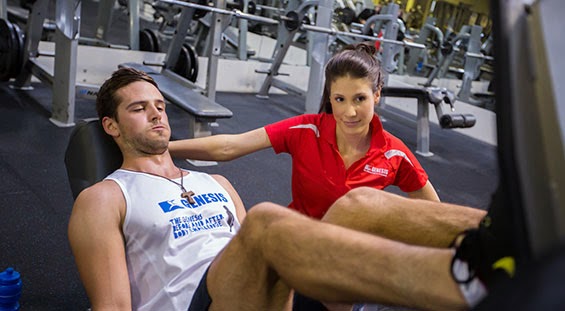Making the commitment to get physically fit is challenging in itself. Once that hurdle is overcome, very few people know where to go from there. To the novice exerciser, a gym full of complex equipment, heavy weights, and bodybuilders can be quite intimidating. Thankfully, personal trainers are available to guide you in the right direction. Here are a few things to look for before working with a personal trainer.
 Passion.
Passion.A vast majority of personal trainers have committed to their careers out of sheer passion for personal fitness. Their desire to remain fit, active, and healthy is passed on to their clients. From your first introduction, you should be able to identify how much your personal trainer loves what they do. It is their passion that will trickle down to you, motivating you to push through those sessions where you feel you don't have anything left to give.
 Understands Their Job.
Understands Their Job.The technical definition of a personal trainer is "a fitness professional possessing the knowledge, skills, and abilities for safe and effective exercise and fitness program design, instruction, and assistance for the purpose of reaching personal health and fitness goals". That is a lot to take in but the essence of the role is- passion isn't enough to be successful. Your personal trainer must know what they're doing and have the ability to teach it properly.
To be effective, their knowledge must expand much farther than knowing the name of every machine in the gym. A qualified trainer is well versed in human anatomy, nutrition, and the science of exercise. They should be able to customize each workout experience to the needs and skill level of the individual or group they're working with at the time.
 Take the Proper Steps.
Take the Proper Steps.No trainer should take on a new client and immediately jump into a workout regimen. After an initial consultation, the first thing to look for is a preliminary assessment. This screening will allow the professional to determine the client's strengths and weaknesses while simultaneously creating an action plan. Certain risk factors such as obesity, injuries, or diabetes will also be taken into consideration. Varying upon the client's medical history, the trainer may also need to obtain permission from the client's primary physician to proceed with certain workout routines.
Next, the personal trainer will ask questions surrounding the client's daily habits. Food they normally eat, current exercise routine (if any), and even the current place of employment are all vital pieces of information. The personal trainer is more than just a workout partner or drill sergeant, it is their job to assist their clients in improving their entire lifestyle.
The final role of a personal trainer is to play hardball. Some people set overly ambitious weight loss goals and it is up to the trainer to say "no" from time to time. Results will never happen overnight. While a good trainer will never let you "quit", they will always encourage their client to listen to their body. Reserving ample time to rest and recover is of utmost importance. Pushing the body past its limits will lead to injury or other counterproductive complications. With a proper assessment, as well as adhering to the suggested nutritional and fitness routine, you and your trainer will have a healthy, long-lasting relationship full of wonderful results.
WhyWeight - don't hesitate, participate, before it's too late!
-Steve, at WhyWeight-

No comments:
Post a Comment